
Pour y participer par Zoom, c’est ici.
Programme :
JOURNÉE I – Lundi / 6 mai 2024
| PÉRIODE | DURÉE | MODÉRATION | PRÉSENTATIONS ET COMMENTAIRES |
| 10h00-10h50 | 50 min | Aude Bandini | Katarina Nieswandt (Concordia)
What Is a Common Good? |
| 10h50-11h00 | 10 min | PAUSE | |
| 11h00-11h30 | 30 min | Karl-Antoine Pelchat | Léonard Bédard (ULaval)
Brouiller la frontière pour mieux exclure. Réflexion critique sur le droit d’exclusion territoriale exercé à l’encontre des réfugié-e-s en contexte canadien Commentaires: Gilles Beauchamp |
| 11h30-12h00 | 30 min | Véronique Armstrong (UdeM)
Vers un écoholisme cynique : comment favoriser les touts écologiques dans un contexte de prédation ? |
|
| 12h00-13h00 | 60 min | DÎNER | |
| 13h00-13h30 | 30 min | Alejandro Macías Flores | Emmanuel Cuisinier (UdeM)
Perception, Heroism, and The Problem of Expression in Merleau-Ponty Commentary: Alejandro Macías Flores |
| 13h30-14h00 | 30 min | Pascal-Olivier Dumas-Dubreuil (UdeM)
Phénoménologie linguistique, mutisme des sens et normativité chez John L. Austin Commentaires: Alejandro Macías Flores |
|
| 14h00-14h10 | 10 min | PAUSE | |
| 14h10-14h40 | 30 min | Karl-Antoine Pelchat | Guillaume Soucy (UQAM)
Une caractérisation constructiviste du point de vue esthétique |
| 14h40-15h10 | 30 min | Frédéric Beaulac (UdeM)
Est-ce que les certitudes basiques sont des connaissances? Commentaires: Guillaume Soucy |
|
| 15h10-15h20 | 10 min | PAUSE | |
| 15h20-15h50 | 30 min | Alex Carty | Alexis Morin-Martel (McGill)
Trust as a Respectful Attitude Commentary: Alex Carty |
| 15h50-16h20 | 30min | Samuel Carlsson Tjernström (McGill)
Why We Cannot Gnostically Wrong Commentary: Karl-Antoine Pelchat |
|
JOURNÉE II – Mardi / 7 mai 2024
| PÉRIODE | DURÉE | ANIMATION | PRÉSENTATIONS ET COMMENTAIRES |
| 10h00-10h50 | 50 min | Aude Bandini | Marc-Kevin Daoust (ÉTS)
Rationalité substantive, rationalité procédurale et approximation des idéaux |
| 10h50-11h00 | 10 min | PAUSE | |
| 11h00-11h30 | 30 min | Karl-Antoine Pelchat | Michaël Lemelin (UQAM)
Une production moindre peut-elle nuire à l’égalité politique ? |
| 11h30-12h00 | 30 min | Alexandre Poisson (UQAM)
Conceptual Import and Interdisciplinarity: Epistemic Contributions of Feminist Philosophy, Critical Race Theory, and Critical Disability Studies to Animal Ethics |
|
| 12h00-13h00 | 60 min | DÎNER | |
| 13h00-13h30 | 30 min | Félix Tremblay | Vincent Rochelle (ULaval)
Transition émotionnelle et formation du groupe : le deuil comme exemple du paradoxe de l’émotion collective diachronique |
| 13h30-14h00 | 30 min | Ellena Thibaud Latour (UdeM)
Undone Science et santé des femmes : politique de l’ignorance et injustices structurelles Commentaires : Laurence Dufour-Villeneuve |
|
| 14h00-14h10 | 10 min | PAUSE | |
| 14h10-14h40 | 30 min | Alex Carty | Jingzhi Chen (McGill)
Being a Good Friend and a Good Believer |
| 14h40-15h10 | 30 min | Mingqiu Xue (McGill)
Epistemic Impartiality in Friendship Commentary : Jingzhi Chen |
|
Colloque Logement et justice sociale à l’occasion duquel les conférencier.es exploreront et discuteront de l’intersection entre les questions de logement, de droits de propriété et de redistribution et d’héritage, dans le contexte des préoccupations de justice sociale.
Organisé par Alexandre Petitclerc (Université de Montréal) et Christian Nadeau (Université de Montréal) en partenariat avec le Centre de recherche en éthique (CRÉ), le Groupe de recherche interuniversitaire en philosophie politique (GRIPP), la Faculté des Arts et Sciences de l’Université de Montréal et le Département de philosophie de l’Université de Montréal.
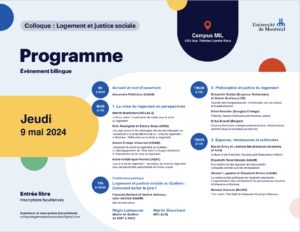
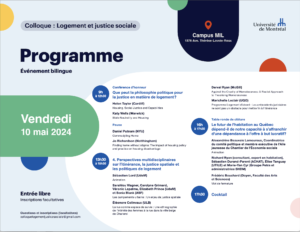
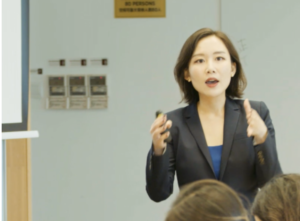
Dans le cadre des conférences du midi du CRÉ, Julia D. Hur (NYU) nous offrira une présentation intitulée « Money on Mind: Performance Incentive, Attention to Money, Environmental Sustainability ».
Pour y participer via Zoom, c’est ici.
Résumé
Environmental sustainability is one of the most pressing problems of our time, raising significant questions as to how to motivate organizational decision-makers to make substantive investments in environmental protection. The current work identifies performance incentives as a critical barrier that prevents organizational decision-makers from supporting sustainability initiatives. We also offer a novel psychological mechanism of how monetary incentives activate managers’ attentional fixation on money, intensifies their zero-sum mindset, and ultimately undermines commitment to investing in sustainability. Across two laboratory experiments (n = 702) and one archival study with a combination of data on executive compensation, corporate annual reports, and environmental performance (n = 14,126), we show that decision-makers whose pay is more contingent on financial performances are more likely to develop attentional fixation on money and less likely to support sustainability initiatives of their organization. Together, our findings demonstrate a novel pathway of how one of the most prevalently used types of financial incentives inadvertently undermine progress toward one of the most urgent organizational changes.

Nous recevrons Richard Healey (LSE) dans le cadre des conférences du midi du CRÉ. Richard nous présentera ses travaux sur les promesses immorales.
Pour y participer par Zoom, c’est ici.
La présentation sera donnée en anglais, mais les questions pourront être posées en anglais ou en français.
Résumé
It is a familiar part of common-sense morality that we are duty bound to keep our promises. However, the creative nature of promissory duties – the fact that the promisor and promisee choose the content of the promises they make – prompts a natural question: Are there substantive constraints on the content of the promises we can make? For instance, can we make binding promises to murder, maim, and steal? Many have the intuition that such promises fail to bind. Taking this intuition as my starting point, this paper develops a novel account of the nature and explanation of the constraints that apply to our power to promise. Most existing views attempt to explain these constraints by appeal to independent duties to which the promisor or promisee are subject. Yet while initially appealing, these views struggle to achieve extensional adequacy, and lack a clear rationale. On the account that I develop, we should instead appeal to the values that underpin the power to promise itself. I argue that a promise creates a form of special relationship between promisor and promisee, and the constraints that apply to that power track the value of this promissory relationship.

Les membres du CRÉ et du GRÉEA sont heureux.ses d’accueillir Angie Pepper (University of Roehampton) et Richard Healey (LSE), qui nous offriront une présentation intitulée « Animals, Inferiority, and Abolition ». La présentation sera offerte an anglais, mais les questions posées lors de la période de discussion pourront l’être en français ou en anglais.
Pour y participer par Zoom, c’est ici.
Résumé
In The Pecking Order, Niko Kolodny argues that natural persons have an irreducible claim against inferiority: a claim “that we not be set beneath another in a social hierarchy” (p. 5). Such social hierarchies, Kolodny suggests, are constituted by untempered disparities in power, authority, and regard. Though Kolodny acknowledges that the lives of many social animals are organised around the “pecking order” (p. 1, p. 87), other animals barely feature in his analysis of relations of inferiority. This omission is striking because many of our relations with nonhuman animals, especially those who have been domesticated, do not arise in “chance, one-off encounters”, but are rather “entrenched in an established, ongoing social structure” (p. 98). Think, for example, of our relations to livestock animals, laboratory animals, and pets. In each of these cases, animals are systematically subordinated by a pattern of social and legal norms that involve untempered asymmetries in power, authority, and regard.
These observations raise the question: Do non-human animals have a claim against inferiority within human-animal communities and hierarchies? In this paper, we argue that they do. Moreover, we suggest that nonhuman animals’ complaint against inferiority supports an abolitionist approach to animal rights. The basic idea is that to fully respect the rights of other animals, we must desist from using them as means to our ends. Importantly, the claim against inferiority not only supports the abolition of practices that clearly cause animals suffering but also those that need not, such as pet keeping.
The paper is structured as follows. First, we defend the claim that sentient nonhuman animals can have claims against inferiority against humans. We consider the view that only those capable of adequately recognising their position within a social hierarchy can have claims against inferiority. In response, we observe that while one’s ability to recognise one’s social position will likely have implications for what constitutes appropriate treatment, nothing in Kolodny’s account necessitates a recognition condition for the claim against inferiority. We further argue that the lack of a recognition condition is independently plausible if we wish to allow, for example, that young children in lower castes and individuals with severe cognitive disabilities can have claims against inferiority. Second, we argue that some nonhuman animals do have claims of inferiority against us. To illustrate this we show that animals have a complaint against being socially positioned as pets, which is grounded in a claim against inferiority. Specifically, we contend that the practice of pet-keeping is a socio-political institution which is constituted by untempered asymmetries in power, authority, and regard between humans and nonhuman animals. Furthermore, we argue that it is not possible to effectively temper these asymmetries while maintaining the practice of living with pets. This is because the tempering factors that undercut objections to social hierarchy in the human case (see Kolodny §5.2 and Ch. 8) either cannot be made to work for other animals (e.g., democratic governance) or otherwise require that the practice be dismantled. If our argument is correct, the implications are significant. Not only does this give us a further reason to abandon practices that harm other animals such as farming and biomedical research, but it suggests that the seemingly more benign practice of keeping animals as pets should be abolished.

Atelier co-organisé par Ophélie Desmons (INSPE de Paris, Sorbonne Université) et Martin Gibert (Université de Montréal).
Avec le soutien du Groupe de recherche en éthique environnementale et animale (GRÉEA), du Centre de recherche en éthique (CRÉ) et de l’UMR 8011 “Sciences, Normes, Démocratie”, Sorbonne Université.
Pour y participer, c’est ici.

Dans le cadre des activités du Réseau de philosophie du travail, W. Jared Parmer (RWTH Aachen University) offrira une présentation intitulée: « Meaning and Alienation in Work ».
Les activités du Réseau de philosophie du travail sont ouvertes aux chercheur.es et aux étudiant.es diplômé.es ayant des intérêts de recherche dans ce domaine. Merci d’écrire aux organisateurs, Denise Celentano (denise.celentano@umontreal.ca) et Pablo Gilabert (pablo.gilabert@concordia.ca), pour recevoir le lien zoom.
Résumé
In this talk, I give a synoptic view of philosophical treatments of meaning in work, and how these treatments point to varieties of alienation in work, too. I suggest that there are neoliberal, liberal, and perfectionist approaches of meaningful work. These approaches distinguish themselves by how they answer two key questions: first, must meaningful work be in some way objectively good? and, second, is work somehow special when it comes to living a meaningful life? They generate different paradigm cases of alienated work as the opposite of meaningful work. I will finally offer some reasons for why I, tentatively, endorse a perfectionist approach to meaningful work.

Junior Thierry Tatsi Tsifo nous offrira une présentation intitulée « L’urgence autour de la libre disposition de son corps : repenser le ‘contrat’ grâce à la gestation pour autrui » dans le cadre des Midis de l’éthique du CRÉ.
Pour y participer par Zoom, c’est ici.
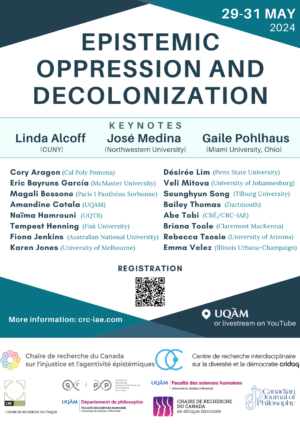
Le colloque international « Epistemic Oppression and Decolonization » de la Chaire de recherche du Canada sur l’injustice et l’agentivité épistémiques d’Amandine Catala (UQÀM) organisé en collaboration avec le CRÉ et d’autres partenaires sera tenu à l’Université du Québec à Montréal (UQAM) du 29 au 31 mai 2024.
Conférences plénières de:
- Gaile Pohlhaus (Miami University, Ohio)
- José Medina (Northwestern University)
- Linda Alcoff (CUNY)
**Le colloque est gratuit et ouvert à tout le monde et il est possible d’assister en ligne via diffusion directe les 29-31 mai (pas d’inscription requise) ou en personne à l’UQAM (inscription obligatoire avant le 8 mai).
Jour 1 – 29 mai 2024
10:00 – 11:15 (Keynote) Gaile Pohlhaus (Miami University, Ohio), Epistemic Pressure and Intersectional Interdependence
Chair: Kristin Voigt (McGill University, CRÉ)
11:15 – 11:25 Pause
11:25 – 12:15 Briana Toole (Claremont MacKenna College), Standpoint Epistemology: Social or Applied?
Chair: Anne-Marie Gagné-Julien (McGill University, CRÉ, CRC-IAE)
12:15 – 1:15 Lunch
1:15 – 2:05 Abe Tobi (Université de Montréal, CRÉ, CRC-IAE), Towards a Relational Account of Epistemic Agency
Chair: Éliot Litalien (Université de Montréal, CRÉ)
2:05 – 2:15 Break
2:15 – 3:05 Cory Aragon (Cal Poly Pomona), Faces of Epistemic Oppression
Chair: Gilles Beauchamp (McGill University, CRC-IAE)
3:05 – 3:25 Coffee break
3:25 – 4:15 Bailey Thomas (Dartmouth College), Conceptualizing Africana Decolonial Epistemologies
Chair: Michelle Martineau (Université de Montréal, CRIDAQ)
4:15 – 4:25 Break
4:25 – 5:15 Karen Jones (University of Melbourne), Defund the Police: How to Identify and Undermine Common Strategies for White Policing of the Borders of Philosophy
Chair: Muhammad Velji (Wesleyan University)
Jour 2 – 30 mai 2024
10:00 – 11:15 (Keynote) José Medina (Northwestern University), Epistemic Border-Crossing: Polyphonic Decolonial Resistance and Collective Epistemic Self-Empowerment
Chair: Yann Allard-Tremblay (McGill University, CRÉ, GRIPP)
11:15 – 11:25 Break
11:25 – 12:15 Emma Velez (University of Illinois, Urbana-Champaign), Latinx Decolonial Feminisms & Epistemologies Hecho a Mano
Chair: Mirjiam Fines-Neuschild (Université de Montréal, CERC, CRC-IAE)
12:15 – 1:15 Lunch
1:15 – 2:05 Eric Bayruns García (McMaster University), Anti-Critical Race Theory Legislation, History of Racial Injustice and Hermeneutical Injustice
Chair: Nick Clanchy (McGill University, CRÉ, CRC-IAE)
2:05 – 2:15 Break
2:15 – 3:05 Tempest Henning (Fisk University), Bad (White) Epistemic Luck
Chair: Leena Abdelrahim (University of Toronto)
3:05 – 3:25 Coffee break
3:25 – 4:15 Fiona Jenkins (Australian National University), Acknowledgment of Country and the Staging of History: Can Practices of Acknowledgment Alleviate Colonial Epistemic Oppression?
Chair: Dominique Leydet (UQAM, CRIDAQ, GRIPP)
4:15 – 4:25 Break
4:25 – 5:15 Rebecca Tsosie (University of Arizona), Non-Ideal Theory and Reparative Justice: The Logic of « Indigenous Rights »
Chair: Karine Millaire (Université de Montréal)
Jour 3 – 31 mai 2024
10:00 – 10:50 Veli Mitova (University of Johannesburg), Decolonial Epistemic-Authority Reparations
Chair: Ryoa Chung (Université de Montréal, CRÉ, GRIPP)
10:50 – 11:00 Break
11:00 – 11:50 Magali Bessone (Université Paris 1 Panthéon Sorbonne), Specters of Haiti: Epistemic Reparations in a Postcolonial Context
Chair: Cheldy Belkhodja (Concordia University, CRIDAQ)
11:50 – 12:50 Lunch
12:50 – 1:40 Naïma Hamrouni (UQTR, CREF, CRÉ, CRIDAQ), The Importance of Colonial Memory in the Conceptualization of Structural Injustices
Chair: Amin Perez (UQAM, CRIDAQ)
1:40 – 1:50 Break
1:50 – 2:40 Seunghyun Song (Tilburg University), Denialism, Doxastic Wronging and Apology
Chair: Marie-Pier Lemay (Carleton University)
2:40 – 3:00 Coffee break
3:00 – 3:50 Désirée Lim (Penn State University), Decolonization, Museums, and the Right to Be Unknown
Chair: Soufia Galand (Université de Sherbrooke, CRC-IAE)
3:50 – 4:00 Break
4:00 – 5:15 (Keynote) Linda Alcoff (CUNY), Imperial Museums and the Claim to Universal Knowledge
Chair: Phoebe Friesen (McGill University, CRÉ)
Cette conférence est rendue possible grâce au généreux soutien des commanditaires suivants:
– Chaire de recherche du Canada sur l’injustice et l’agentivité épistémiques/Canada Research Chair on Epistemic Injustice and Agency (CRC-IAE)
– Centre de recherche interdisciplinaire sur la diversité et la démocratie (CRIDAQ)
– Centre de recherche en éthique (CRÉ)
– Groupe de recherche interuniversitaire en philosophie politique (GRIPP)
– Canadian Journal of Philosophy (CJP)
– Faculté des sciences humaines, UQAM
– Département de philosophie, UQAM
– Chaire de recherche du Canada en éthique féministe (CREF)
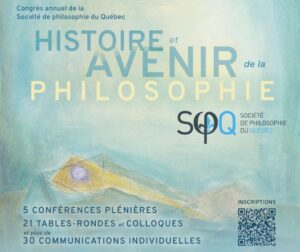
ChatGPT et l’éthique : réflexions autour des Grands modèles de langage (LLM) et autres algorithmes de génération.
Le Centre de Recherche en Éthique (CRÉ), Martin Gibert et Thomas Adetou sont heureux de vous inviter à soumettre une proposition de communication dans le cadre d’un colloque organisé lors du congrès annuel de la SPQ, le 6 juin 2024 au Cégep de Saint-Jean-sur-Richelieu.
Celui-ci portera sur l’éthique des algorithmes de génération comme Midjourney ou Dall.e (génération d’image) ou des Grands Modèles de Langage comme ChatGPT (génération de texte). L’objectif sera d’explorer les implications éthiques découlant de l’émergence des algorithmes de génération, en mettant en lumière les défis et les opportunités qu’ils offrent dans le paysage philosophique contemporain. Nous espérons créer et encourager un espace de dialogue interdisciplinaire propice à l’exploration des interactions entre les algorithmes de génération et le champ de l’éthique.
L’appel à communications sera clôturé 05 mai 2024 à 23h59. Les soumissions devront respecter les critères suivants :
• Un résumé d’une longueur maximale de 300 mots en français.
• Le sujet de la communication doit se situer dans les champs de l’éthique et/ou des algorithmes de générations.
• Les textes devront être acheminés à l’adresse suivante : amah.adetou@umontreal.ca
Le colloque sera l’occasion de contribuer à la diversité et à la richesse des échanges lors de ce congrès qui marque les cinquante ans de la SPQ.
Pour toutes informations : amah.adetou@umontreal.ca



